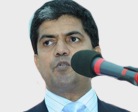 Sri Lanka is a country where abductions, disappearances, killings and general human rights violations happen with impunity. Law and order is applied selectively. Racists are promoted to higher ranks and government allegedly colludes with armed paramilitary in abductions and disappearances. In recent times, Sri Lanka has taken a step further in breaching international law, Geneva conventions and UN charters that it is signed up to. In the name of "war on terror", Sri Lanka conducted mass murder in broad daylight.
Sri Lanka is a country where abductions, disappearances, killings and general human rights violations happen with impunity. Law and order is applied selectively. Racists are promoted to higher ranks and government allegedly colludes with armed paramilitary in abductions and disappearances. In recent times, Sri Lanka has taken a step further in breaching international law, Geneva conventions and UN charters that it is signed up to. In the name of "war on terror", Sri Lanka conducted mass murder in broad daylight.
What are we going to tell our own kids when they ask us what we did to save those children? We know from the UN secretary general that more than 50,000 children are living under "appalling conditions" in barbed-wire open prisons. We also know that in the weeks preceding the end of the war at the end of last month, over 20,000 innocent lives were lost and possibly over a third of that were children. Many of them died due to starvation and lack of medical care as the government of Sri Lanka, refused the calls of institutions like the Red Cross and the UN to send sufficient food and medicines.
"Sri Lanka must stop using heavy weapons and stop shelling the no-fire zone," said Hilary Clinton – the conflict continued. The United Nations and international governments, including our own, called for a "temporary pause" for the civilians to leave without securing adequate guarantees from the government of Sri Lanka for access and facilities – the conflict continued. The Red Cross called it a bloodbath waiting to happen – the conflict continued. Human Rights Watch called the no-fire zone the most dangerous place in the world – the conflict continued. Tamil diaspora hit the streets of every major city, warning against the impending human catastrophe and highlighting the continuous usage of heavy weapons in a congested area, and lack of food and medicines for suffering people – the conflict continued.
The UN, which includes great countries like India and South Africa where remarkable men like Mahatma Gandhi and Nelson Mandela came from, approved this genocide at the United Nations Human Rights Council (UNHRC). Incidentally defeated at the UNHRC on a vote, a resolution that was supported by the British government was a farce, as although it called for a war crimes investigation, this inquiry is to be carried out by the government of Sri Lanka.
Did we forget that the UK was instrumental in removing Sri Lanka from the UNHRC in May last year for its appalling record on human rights? Did we forget what happened to the presidential inquiry that was set up soon after the Independent International Group of Eminent Persons, which left Sri Lanka citing among many reasons the lack of co-operation to investigate some of the horrendous crimes that were committed in the recent times – notably the 17 aid workers allegedly shot by the Sri Lankan army in close range with their hands tied behind their back? Did we forget the fates of many independent journalists including Lasantha Wickrematunge? Or did we forget that the atrocities perpetrated by both sides have been condemned equally, even though one side is a state signed up to various international conventions and charters. The other is a terrorist organisation, as proscribed by many countries, including the UK.
Yet, the UK supported a resolution for the government of Sri Lanka to investigate itself.
When the international community went after leaders like Slobodan Milosevic and Omar al-Bashir for committing crimes against humanity and war crimes, humanity prevailed. When the head of UNHRC, Navi Pillay, calls for an independent international inquiry in Sri Lanka and when the UN secretary general makes a similar but likely flimsy call, after a great deal of effort of persuasion by the French and British media, one remains hopeful that maybe, just maybe, one day justice will be done for those who died in vain and for those who are suffering in barbed confinement. There is hope when experienced British human rights lawyer and international war crimes judge, Geoffrey Robertson QC, comments that there are avenues other than the UNHRC to prosecute perpetrators of war crimes.
Bernard Kouchner and David Miliband returned empty-handed while the war was ongoing, but did make the right noises of possible war crimes investigations against both parties. On his return from Sri Lanka Miliband formally stated that the government will do all it can to pursue such an investigation. This week both parliament and House of Lords members from all parties supported a call for such an investigation.
"When genocide is happening," said Obama, so eloquently during the second presidential debate, "when ethnic cleansing is happening somewhere around the world and we stand idly by, that diminishes us."
Going by what happened at the recent vote at the UNHRC, one shouldn’t be too surprised if after a fudged investigation,the international community satisfies itself by condemning the Liberation Tigers of Tamil Eelam while mildly reminding the government of Sri Lanka of human rights conventions and international humanitarian laws – essentially forgiving the perpetrators of state terrorism.
If not for the perished Tamils’ sake, then for the sake of humanity, leaders like Obama, Brown and Ban ki-Moon, and others must without fail bring the perpetrators to justice.
(For updates you can share with your friends, follow TNN on Facebook and Twitter )
